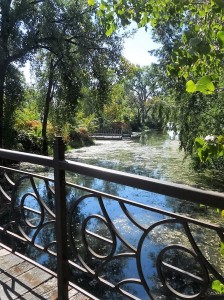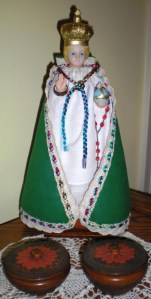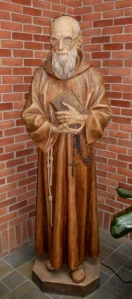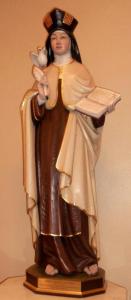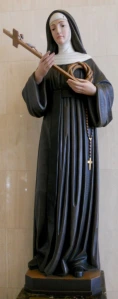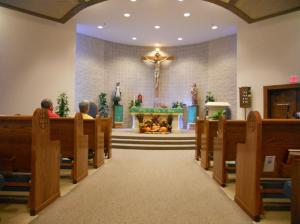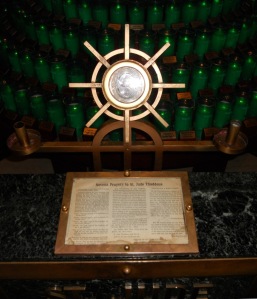Some messages are Wind Song commercials: simply unforgettable. They can be funny, sad, quiet, loud, true-to-life— or sometimes so bad— that they linger. But the best ones are authentic and captivating, inspiring google searches even when the topic is familiar.
Today’s “sermon” hit the spot like an E. F. Hutton commercial— people listened— and some of us were so invested that we even blurted out responses to Fr. Joe’s rhetorical questions. But that’s what heaven does: it totally gets our attention.
==========
The following, recorded, transcribed, and edited, was delivered by Fr. Joseph Craft at the St. Louis Cathedral in New Orleans.
We have some spectacular readings today. We need to find out what exactly happened on Mt. Horeb. How many of you have got that great historical mind that you can remember all the important events that happened on Mt. Horeb?
The burning bush!
When Moses goes down to Egypt he sets Israel free and, when he passes Mt. Horeb again, God makes a covenant with them. They go out of the desert and, when they come back, Moses has this wonderful conversation with God that includes the Ten Commandments. Years later, Elijah comes along after slaying all the prophets of Baal and, after running from the queen, Jezebel, lands on Mt. Horeb and finds God not in the earthquake or the fire or the storm, but in the small voice.
What are the words we hear today that God promises Moses on that mountain? They will worship God on that mountain. That’s what we need to get so far. God wants to be in relationship with his people, so he gives us a place to encounter him and worship him.
Do you know where we stand today? At sea level?
We stand kind of on Mt. Horeb. We stand in a place where we can worship God. That’s why we come to Mass.
Some people tell me, “You know, padre, I don’t get much out of the Mass.” I say, “That’s great! It’s not really about you. It’s about us giving worship to God.”
That’s what we’re here about. So, okay, let’s try to figure out where I’m making the connection between Mt. Horeb and here. Did you hear the gospel?
Jesus is teaching us how to be in relationship with the Father: to worship God and to give him praise for all he’s done. This is a beautiful priestly prayer, and we are a priestly people. When we were baptized, we were anointed priest, prophet, and king; so today’s gospel reading is helping us know what we’re here after.
Does anybody know what we’re here after?
We’re here after the hereafter: heaven on earth. When you and I receive the Word of God and the Eucharist, we’re supposed to become what we receive. Does that make sense?
Let me break it open one more time: Does anybody know what heaven’s going to be like? Has anybody been there?
I can tell you what heaven’s going to be like. And, no, it won’t be angels playing violins on the clouds. It will be where everyone is doing the will of the Father.
We come here to worship God. He gives us the grace to hear the Word: how to live as he’s commanded. And then he gives us the Eucharist: the grace to live that out. We make heaven on earth by doing the will of the Father, and we start by getting outside of ourselves and giving God praise and worship.
Let me just hit a few more things.
Do you know when we worship God here on Mt. Horeb? It’s when we genuflect. It’s when we stand for the gospel. It’s when we kneel. But let me name two other really great places of worship. You ready?
The first is after we’ve heard the Word of God, after we’ve listened to the sermon, after we’ve done the priestly prayers. It’s the little blessed moment of silence, after we’ve received the Eucharist, when we ask God to help us do his will to make heaven on earth. And, do you know the next most important time when we give that worship? It’s when we wait for the priest to walk all the way out of church. Sometimes people think that’s because the priest likes to have all that attention or so he can give that one parishioner that needs it that serious look: “You’d better do that this week!” Nope.
Do you know why we ask you to stay here till the very end?
It’s so you can kneel one more time and say, “God, thank you for this encounter. Now I’m getting ready to go out and live the hardest part of my week— away from you this close— so give me the grace to use what I’ve received.”
My brothers and sisters, today, let us worship. Let us give God praise. And let us make heaven here on earth.
Links of interest… Archdiocese of New Orleans… Commercials: E. F. Hutton / Wind Song (more)… Elijah (journey – mystery of God’s silent speech – on Mt. Horeb – story)… God speaks to us on tops of mountains… How Jesus makes heaven present to us today… Jezebel… Moses: about / burning bush… Most Americans believe in heaven… and hell… Mountains, the Bible, & divine encounters... St. Louis Cathedral: daily saints / history / Mass / photos / tours / website... Prophet’s legacy… Seeking Mt. Horeb… Sermon vs. homily… Ten Commandments… Time to decide— reflection on a question from Elijah… Why praise & worship music is praise, but not worship…
WP posts… Beatitudes… Blessed blessing… Collective heart… Corpus Christi… Foundation… Freedom… God’s love letter… Graces shared… Mary’s gifts… Most Holy Trinity… Perfect prayer… Salt and light… St. Joseph… Sunset… Truth
Filed under: homilies, Moses, praise and worship, spiritual gifts | Tagged: building community, God's master plan, St. Louis Cathedral-New Orleans LA | Leave a comment »






